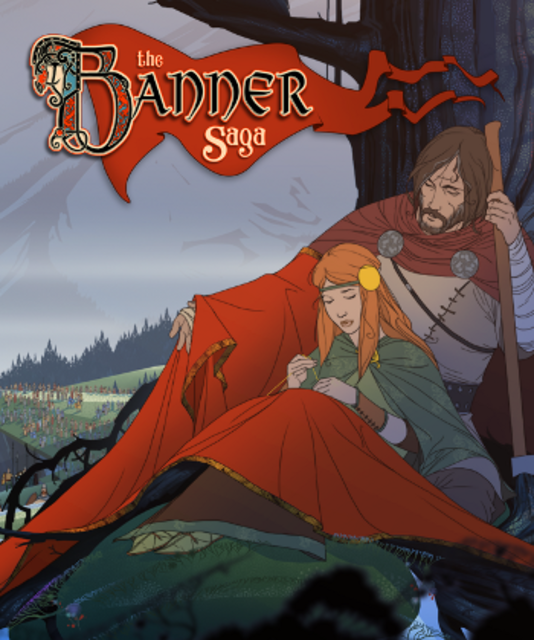The Banner Saga Review: You Are A Viking
XCOM meets Norse mythology in The Banner Saga, 2014’s first great RPG. While safety and morale propel interactions between the main characters and shady NPCs, players command axemen and archers on the battlefield, and assign items and skill points back at snow-frosted camps. Sudden irreversible permadeath, which claims heroes at a moment’s notice, ties the unsettling ambiance together, though I would modify my analogy slightly: The Banner Saga also embraces The Oregon Trail's cross-country trailblazing and all the despair and dangers that come with it.
The story is the catalyst for the destitution, the savagery, the deception. The sun has stopped moving and no one knows why – something about dead gods and serpents the length of mountains – but this omen appears ancillary to the threat in the north. The dredge (mechanical golems) have returned, sacking human and varl (horned giants) civilizations without warning, compelling villagers to fight or flee.
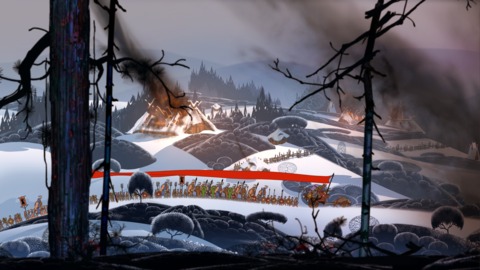
The campaign follows two separate caravans – one led by the diplomatic varl Hakon, the other by everyday huntsman Rook. And while their paths remain predetermined, how they deal with dredge and low morale changes playthrough to playthrough. Not counting the protagonists you take into combat, convoys consist of kinsmen, warriors, and varl that minimize casualties in unseen skirmishes. Although comrades can go on the attack, establish defensive perimeters, or retreat, these battles conclude with little input.
The rest of the conflicts let you do the heavy lifting. Six of your dozen odd heroes wage war on tactical grids, though you can queue up their attack order or swap out the injured before clashes commence. The turn-based disputes then alternate between you and the enemy, but fans that dove into last year’s Banner Saga: Factions know the game’s depth delves much deeper. A hero's armor reduces damage through simple subtraction. Strength, however, affects vitality and attack strength. Whittling away at a dredge’s outer shell allows you to wipe out more hit points in future assaults, though the AI could cripple those plans by targeting your champion’s health directly.
The Banner Saga is not want for challenge, either. Dredge harass fighters left by their lonesome, gang-up on the group’s tank, and withdraw when near death, calling reinforcements if ignored. To even things up, allies require willpower. This limited resource lets characters traverse extra spaces, adds damage points to their strikes, and charges special attacks. Gunnulf sunders man and machine in a whirlwind swing of his claymore, while Hakon’s overhead smash sends shock waves through adjacent enemies. I breathed a sigh of relief whenever I sent foes to the afterlife two at a time.
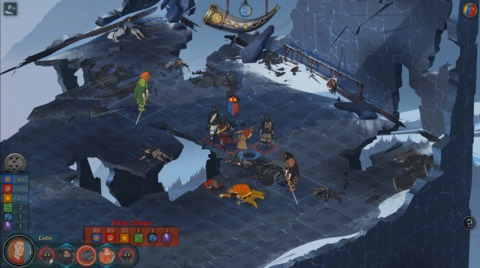
With Hakon, too, I had the power to take risks. I faced dredge and brigands head-to-head – none could touch my clan. Controlling Rook, I never knew who would survive till dawn. Weirdly, characters do not die when crushed beneath opposing hammers and swords – they incur penalties to their strength and armor, wounded but alive. Rather, developer Stoic saves permadeath for random events (i.e., dialogue trees) that test a person’s leadership. Egil, a young man I had just met, sacrificed himself to rescue Rook’s daughter because I refused to distract invading dredge.
Another example: An early run-in with bandits presented several solutions. When I invited them to join Rook’s expedition, asking them to fight for their food, they stole irreplaceable provisions. I chose to give chase, cornering the thieves before executing them without hesitation. Amid the commotion, sadly, the rogues stole additional supplies. One restart later, I ambushed the raiders first, losing innocent civilians in the chaos.
Even the less dire scenarios put me on edge. Do you send out search parties for a child that wandered from camp, or abandon the kid to his fate? Would you desert the boy knowing those scouts may not return, too? Or would you still tarry, costing the caravan rations? These gray areas dominate The Banner Saga. They have no right answer, no acceptable outcome, and repercussions rarely manifest until hours later. A prisoner I thought to be vulgar and untrustworthy saved Rook's life when someone I welcomed with open arms stabbed him in the back.
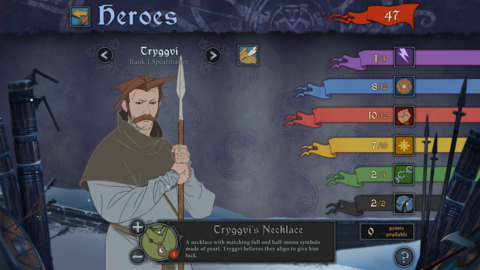
The Banner Saga is not fun by definition. This chapter is a prelude to an inevitable sequel – a disparate ten-hour prologue that wraps up without sufficient resolution. (The ending literally left me asking, “Is that it?”) But an omnipresent dread permeates every conversation and set piece in this dark, foreboding setting, where the narrative regularly reminds players of their previous mistakes. I bore responsibility for those who perished under my authority, and yet I want more.
The betrayals taught – forced – me to be cautious. The longer refugees march without rest, the more ornery they become. The lower morale drops, the more in-fighting that occurs. And when spirits bottom out, the less willpower warriors wield in battle. Setting up camp alleviates emotions and heals the injured, but only when you have provisions to spare. Though no one dies of dysentery in The Banner Saga, starvation is as common as it is unwanted.
To purchase supplies, you need renown, a currency earned every time you slay opponents. The trouble is, renown also upgrades your soldiers, improving willpower, armor, and strength once they meet their kill quota. And you never have enough to go around. Keeping with the game’s unforgiving theme, you can appease the populace or raise an army of juggernauts, not both. It is a harsh reality, one I was willing to adhere to given the rare, beautiful fusion of Nordic inspiration and end-of-the-world premonitions.
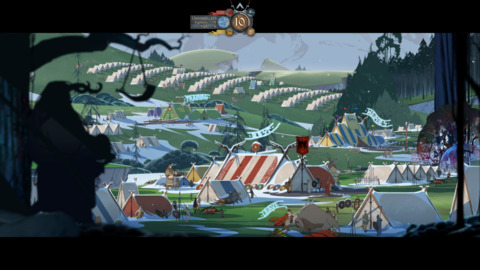
The Banner Saga is mesmerizing in its low-key art, mixing unobtrusive colors and soft brush strokes just like Disney’s hand-drawn films of the ‘50s and ‘60s. The map is a Tolkien nerd’s dream as well, offering insight into each city, forest, and fjord. I lost myself in the lore, spending hours reading up on the world. To round things out, the soundtrack overpowers the player with subtle harmonies – a reserved, but poignant blend of orchestral brass and strings from Austin Wintory, the man behind Journey’s sobering compositions.
Not surprisingly, the music and visuals benefit The Banner Saga’s message. While victories prove hollow and every death dampens the group’s self-esteem, the developers replicate the ambiguous storytelling of The Walking Dead. Why did the dredge violate centuries of peace? Was it bloodlust? Revenge? Time will tell, but who will be the bigger monster when all is said and done? The dredge did not steal those farmers' animals. They did not abandon hungry families to the cold. So, no, I do not mind that the conclusion left me hanging. If Stoic can top The Banner Saga, I am willing to hold on until part two arrives.
Written for WikiGameGuides.com. Like the review? Follow me on Twitter.
